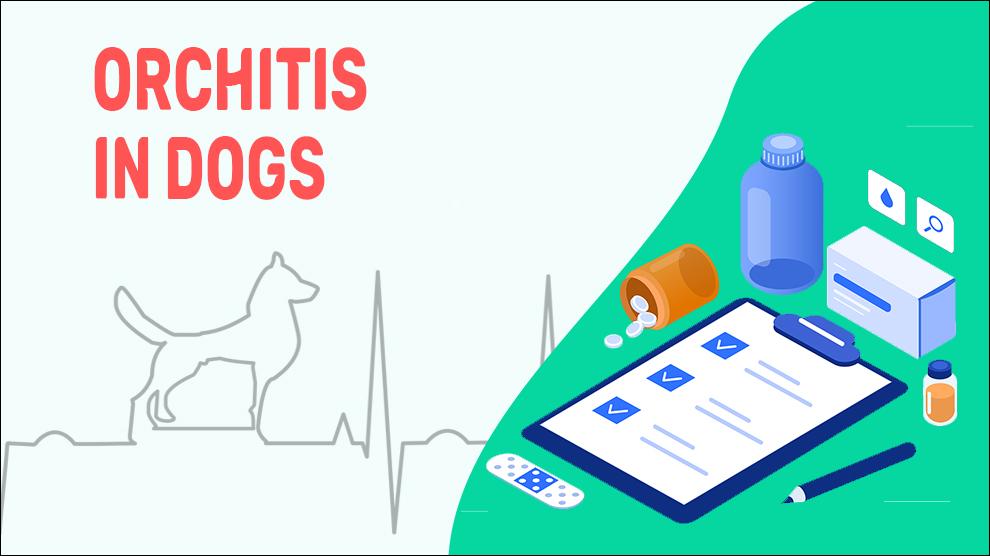Orchitis is an inflammatory condition of the testicles or testes in dogs. This may be unilateral (one) or bilateral (both) testicles. On the presentation of clinical signs, Orchitis can be acute and symptomatic or asymptomatic and chronic.
Isolated orchitis is uncommon and it is often associated with epididymitis, which is inflammation of the epididymis (testicular tube where sperm is stored) since the two structures are so closely related.
Canine orchitis is typically caused by a bacterial or viral infection where the pathogens infiltrate the testes via the prostatic secretions, urine, mucus membranes, blood, or wounds. Other causes of orchitis include immune-mediated conditions, fungal infections, tick-borne diseases, neoplasia, granuloma formation, or spermatocele.
Male Intact dogs that mostly roam outdoors are at increased risk for developing orchitis. Older intact male dogs with a history of urinary tract infections or chronic prostatic infections are also at risk. If left unchecked or untreated, the condition has long-term effects resulting in irreversible damage to reproductive systems, causing infertility.
Symptoms Of Orchitis
- Swollen Testicles / Scrotum / Epididymides
- Scrotal Skin Irritation (Dermatitis).
- Licking of the Scrotum.
- Abnormal masses in the Scrotum.
- Refusal to eat / Loss of appetite
- Non-localized symptoms include pain and fever.
- Unwillingness to play and general weakness.
Treatment Options For Orchitis
Mild Orchitis often gets cleared on its own and it just requires keeping the genital area clean. If needed, topical antibiotics and antiseptic flushes can be applied.
For chronic, more severe, or recurrent cases- treatment options may include:
- Removal of the underlying cause if one is found, such as tumors, adhesions, or abnormal tissue.
- Antibiotic therapy/ Anti-fungal medication
- Anti-inflammatory medication or analgesics (medication for pain relief).
- For immune-mediated disease, immunosuppressive drugs (such as prednisone) are indicated.
- Intravenous Fluids
- Cold Compresses
- Neutering the dog
Home Remedies For Orchitis
Treatment for mild forms of orchitis in dogs can be done quite easily, and in most cases is very effective.
Proper examination of the genitals for infections, lacerations, and tumors is necessary. Sedation or anesthesia of the animal is required for a thorough examination, particularly if the dog feels pain in the area.
An appropriate diagnosis of this disease is always best left to your vet to make sure that it is not progressing into a serious form.
Prevention Of Orchitis
Optimizing your pet’s overall health should be the top priority for preventing problems in his genitals from happening in the first place.
Diet: Nutritionally balanced, wholesome diet formulated for the dog’s size and lifestyle.
Weight: Maintenance of ideal weight for the dog.
Exercise: Right amount of exercise is needed, low-intensity exercise leash walking, short hikes, and indoor games.
Hygiene: Usually dogs self-clean their genitals, but there will be times you may need to clean those using non-scented wipes or just give a quick rinse in running water.
Dogs might need a grooming every so often to avoid infections.
Use an Elizabethan collar to prevent the dog from excessive licking and self-trauma.
Affected Breeds Of Orchitis
Male Dogs
Additional Facts For Orchitis
Causes:
- Bacterial Infections - Brucella Canis, Escherichia Coli, Staphylococcus, Streptococcus, Mycoplasma, and Proteus.
- Viral Infections: Mumps, Canine Distemper Virus, Cytomegalovirus (CMV).
- Fungal Infections: Coccidiomycosis and Blastomycosis.
- Tick-Borne Diseases (Rocky Mountain spotted fever and Ehrlichiosis).
- Trauma to the testicles.
- Autoimmune Disease - Lymphocytic Orchitis
- Previous episodes of epididymitis.
Morbidity:
Orchitis complications may include:
- Testicular Atrophy: The shrinking or reduction in the size of the affected testicle.
- Scrotal Abscess: The collection of pus in the infected tissue in the scrotum.
- Infertility: Orchitis can cause hypogonadism (inadequate testosterone production) or even infertility. When orchitis affects only one testicle, these are less likely to happen.
Mortality:
Mortality associated with orchitis is not documented. A swollen testicle with or without pain can be testicular cancer, so it should be diagnosed immediately.
Diagnosis:
- Complete blood count (CBC), Biochemical profile, and Urinalysis.
- Blood cultures and Fungal serology titers.
- Cytology (microscopic analysis) and culture of semen.
- Brucella Canis serum titers.
- Biopsy or castration with histopathology
- Scrotal Ultrasound
- Testicular Aspirate
Differential diagnosis:
- Inguinal Hernia
- Hydrocoele
- Testicular Cord Torsion
- Spermatic Artery Thrombosis
- Testicular Neoplasia
- Neutrophilia
Prognosis:
The prognosis of a full recovery for your dog is good. Most dogs suffering from orchitis get well completely with no long-lasting effects. The underlying cause is to be identified and treated properly.
Sometimes, an ascending infection or chronic condition may lead to incurable prostatitis.
Mild Orchitis or Epididymitis - Dogs start to recover within a few days but sometimes, it may take up to 2 weeks to fully recover.
When To See A Vet
Contact your vet right away, if you notice any of the following:
- Enteritis with diarrhea and vomition.
- Puppies - Myocarditis (Difficult breathing, Cough, Weakness).
Food Suggestions For Orchitis
- Nutritionally balanced, wholesome diet.
- Avoid DRY FOOD and go for a fresh diet.
- When opting for Commercial foods, they should have high-quality, natural ingredients, with no artificial additives.
- The raw diet, Semi-Homemade Food (commercial homemade diet with a dehydrated formula), or home-cooked meals.
- Protein (required levels of bioavailable protein).
- Fibre Rich Foods: Apples, Pears, Oatmeal, and other foods.
Conclusion
As orchitis is not a disease in itself (most of the time) and is a symptom, treatment will depend on the predisposing cause.
Mild orchitis may not even require treatment but will be able to resolve in due time.
In more acute cases of doubtful or difficult conditions, always consult a veterinarian.

















